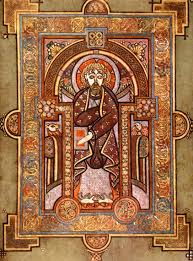The
medieval world
Celtic art
Celtic art
·
Extreme northern parts of Europe
Ireland, Scotland, Iceland and northern Scandinavia
· Preserve of the indigenous pre historic style
· Originated in the middle rhine area
· Brought to british isles by retreating celtic tribes
-Preserved characteristics -
-then swept across rest of Europe
· Dark Ages 400-1000 AD
· Not much celtic art survived from this period
· Early celtic art of the pre roman period survived as a continuous tradition in Ireland until the influence of Christianity
· Took 200 years for Christianity to be introduced to Britain
· Very little evidence of celtic art during roman occupation
· Truly arrived with the mission of St Ninian
- disciple of St Martin of tours
· Built a church - whithorn, Wigtownshire 412 ad
· Not long after Ireland was converted by st Patrick
· During 6th cent process of conversion spread to wales, the picts in north of Scotland and the Saxons in England
· 6th&7th cent the northern church became the shelter of Christianity in Europe
· Direct contact was made by the east and the north
· The church that became the church of Scotland was also made familiar , from the beginning with the scriptures, eastern forms of prayer and praise as well as eastern missionary methods
· the whole range of celtic art divides into two periods
- early pre Christian period - style deriving from Neolithic age
- late post Christian period – stylistic influence from the east
FIND PICTURES:
· 1 the vernacular style from 7th cent till 850 ish

·
2 the hiberno- Viking style from 850- 1000

the of period
Viking domination in Ireland-
· 3 the last animal style, from 1000 to 1125

·
4 the hiberno- Romanesque style 1125- anglo
saxon conquest
 ·
Ornamentation of early celtic period:
·
Ornamentation of early celtic period:
linear- geometric- abstract
· Book of kells 8th cent manuscript

·
Non organic yet super organic
· Life defying qualities
· Completely abstract characters
· A reflection of spiritual life of northern people
“the heavily oppressed inner life of northern humanity” worringer
Ireland, Scotland, Iceland and northern Scandinavia
· Preserve of the indigenous pre historic style
· Originated in the middle rhine area
· Brought to british isles by retreating celtic tribes
-Preserved characteristics -
-then swept across rest of Europe
· Dark Ages 400-1000 AD
· Not much celtic art survived from this period
· Early celtic art of the pre roman period survived as a continuous tradition in Ireland until the influence of Christianity
· Took 200 years for Christianity to be introduced to Britain
· Very little evidence of celtic art during roman occupation
· Truly arrived with the mission of St Ninian
- disciple of St Martin of tours
· Built a church - whithorn, Wigtownshire 412 ad
· Not long after Ireland was converted by st Patrick
· During 6th cent process of conversion spread to wales, the picts in north of Scotland and the Saxons in England
· 6th&7th cent the northern church became the shelter of Christianity in Europe
· Direct contact was made by the east and the north
· The church that became the church of Scotland was also made familiar , from the beginning with the scriptures, eastern forms of prayer and praise as well as eastern missionary methods
· the whole range of celtic art divides into two periods
- early pre Christian period - style deriving from Neolithic age
- late post Christian period – stylistic influence from the east
FIND PICTURES:
· 1 the vernacular style from 7th cent till 850 ish
· 3 the last animal style, from 1000 to 1125
linear- geometric- abstract
· Book of kells 8th cent manuscript
· Life defying qualities
· Completely abstract characters
· A reflection of spiritual life of northern people
“the heavily oppressed inner life of northern humanity” worringer
No comments:
Post a Comment